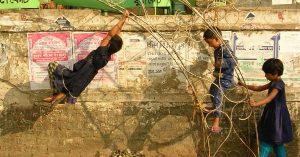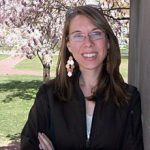 We cannot Name or be Named without language. If our vocabulary dwindles to a few shopworn words, we are setting ourselves up for takeover by a dictator. When language becomes exhausted, our freedom dwindles – we cannot think; we do not recognize danger; injustice strikes us as no more than “the way things are.”
We cannot Name or be Named without language. If our vocabulary dwindles to a few shopworn words, we are setting ourselves up for takeover by a dictator. When language becomes exhausted, our freedom dwindles – we cannot think; we do not recognize danger; injustice strikes us as no more than “the way things are.”
– Madeleine L’Engle, Walking on Water
I remember sitting in a chair across the desk from my campus minister in the summer of 2001. We had just arrived home from a mission trip to South Africa, where we had directed a team of 30 college students in building a church and teaching junior-high aged students for two weeks. I had the deep joy of making art pastel projects with 15 twelve-year-old students. This had been my first overseas missions experience, and I was undone. Like many in similar positions, I had never seen that level of need. My pastor graciously told me to calm down. To take a deep breath.
You see, my sense of compassion has always been a paralyzing force in my life, especially in hearing God speak his calling into my heart. I would periodically become so overwhelmed, that my primary response was, “I must be called to (insert troubled part of the world here).” And then the fear would kick in. Could it be true? Was God calling me to China, to inner city Boston, to South Africa’s poorest neighborhoods? I had considered beginning an MFA program in visual art at this time, but I couldn’t escape the anxiety of a confused call. The problem with this method of “discernment” was that there were way too many difficult places in the world for one 20-something woman to conquer with her compassionate heart. And the truth of the matter was, I was allowing my compassion mechanism to make me a slave to guilt. And then to apathy.
This is just the way things are in the world now.
And the voice, the Word of God, could not nestle in my troubled heart. I couldn’t hear him.
Three years after my trip to South Africa, I was in seminary, learning to hear the voice of God. Sensing my call to ministry. And the call I sensed, to my surprise, was to those art pastel pictures I had created in the dirt-floor classroom in Mayflower, South Africa. And to the canvas in my studio. And to the artists in my church and community. To creative language.
We cannot Name or be Named without language.
We can neither instill hope nor hear it for ourselves without language. Sometimes I wonder how many of our churches and families have lost our language. Fast forward to 2015. I am married to a wonderful husband who has a PhD in liturgical studies. We have both fallen in love with the animating and anchoring language of the church’s history. We read the Book of Common Prayer together with our little boy, and we seek out churches which do the same. Why? Because, as Madeleine L’Engle writes, “Where language is weak, theology is weakened.” And action follows. We are called to creative language.
When language becomes exhausted, our freedom dwindles – we cannot think; we do not recognize danger; injustice strikes us as no more than “the way things are.”
A familiar feeling came over me when I lay down in bed last night. Following the Superbowl, all I could think about was human trafficking – how many innocents were forced into slavery while the rest of us were enjoying Katy Perry’s flamboyant performance? My mind was stuck, and I picked up the book on my nightstand. Calm down. Take a deep breath. I tried to give voice to the depth of emotion. Creative language. Prayer.
As I write this post, both the Book of Common Prayer and my art supplies sit nearby. These items represent my own capacity, created in the image of the Creator, to Name and be Named. To resist fear and apathy when I am overwhelmed. To take action.
How do you make space for creative language? What are the mechanisms that help you hear the voice of God speaking your Name? What gifts has he given you to offer hope to others? I challenge you today find hope in the common language of the liturgy, and in the common calling to creativity. Sometimes we are called to go. Sometimes we are called to stay. But I believe we are all called to speak with creative language. After all, in the beginning was the Word.
 Shannon Steed Sigler is a community artist, curator, and theologian. She also serves as the Director of Social Media Communications for BeADisciple.com. Shannon is the mother of a creative three-year-old and the wife of a liturgical scholar. Her own work and research center around a Wesleyan paradigm for the visual arts. Visit her website here.
Shannon Steed Sigler is a community artist, curator, and theologian. She also serves as the Director of Social Media Communications for BeADisciple.com. Shannon is the mother of a creative three-year-old and the wife of a liturgical scholar. Her own work and research center around a Wesleyan paradigm for the visual arts. Visit her website here.
Main post image by Mark Knobil.







When I have the opportunity to hear what God is doing in someone’s life, especially if they are a youth or young adult, my hope overflows.